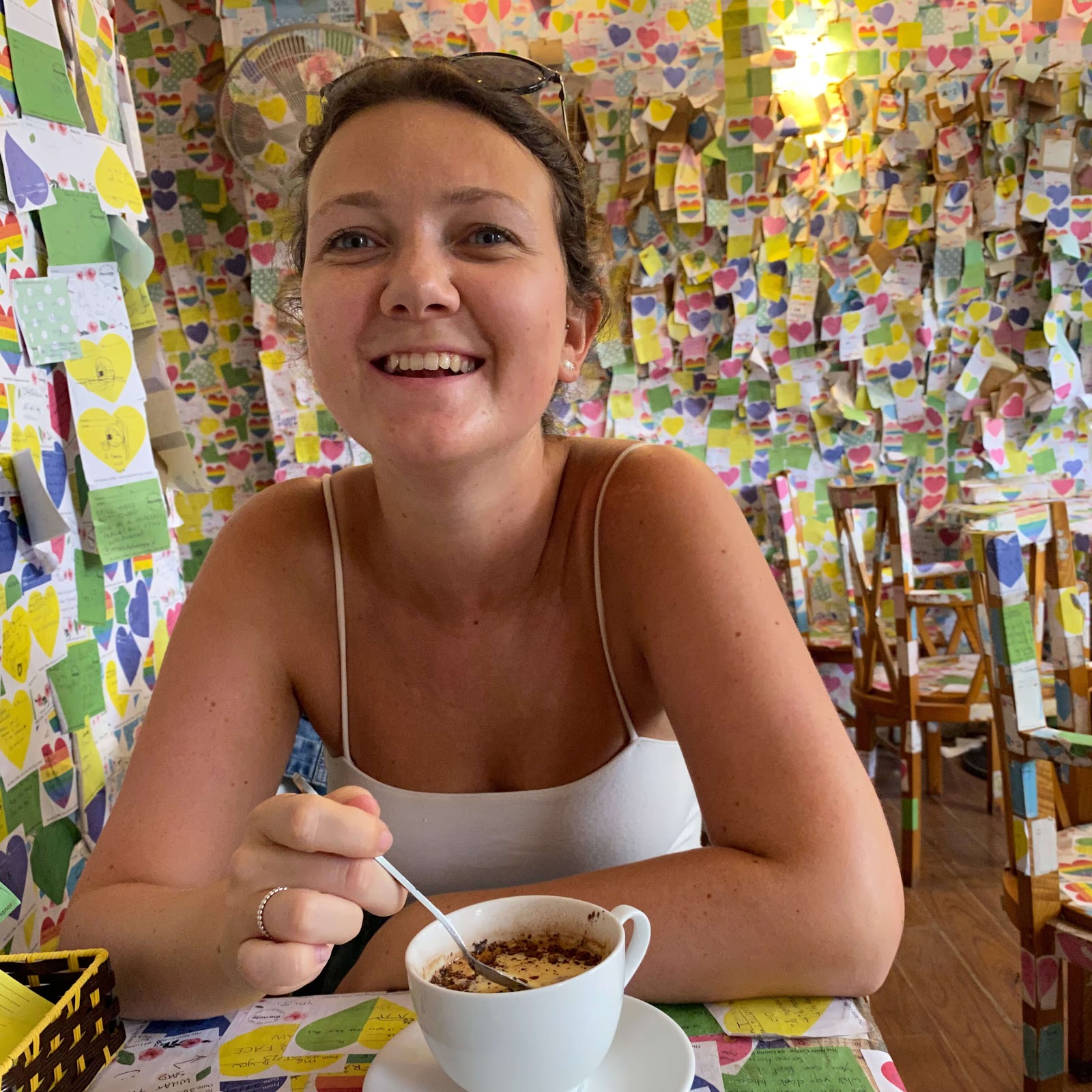Well hello to you my reader chums! Backpacking Asia for the second time was a dream come and honestly, as I've mentioned in previous blog posts, one of the best life experiences to date. I miss the dreamy sunsets on the islands, the chaos of city life and seeing gorgeous historic temples, as well as friendly locals smiling in the streets.
If you're planning a backpacking trip to Asia across multiple countries, here is everything to know before backpacking Asia.
Paying with cash is the norm
In the UK, using cash seems awfully unnatural but across most countries in south and southeast Asia, it's the norm. Don't expect to walk into restaurants and cafes, especially ones run by locals and be able to pay with a card. Most of the time it's cash or there will be a charge on your card. It's best to bring a suitable amount of cash with you or draw it out at the ATM. Due to ATM charges, I'd recommend getting the highest amount possible to save you keep paying additional charges.
Eating street food is a right of passage
Street food is just a dream! Whether it's pad Thai in Thailand, fried noodles in Malaysia or banh mi in Vietnam, locals know how to cook good food for a very cheap price. Often street food can range from 50p to £3 at most, depending on the country you're visiting of course. It's incredibly cheap but also beautifully full of flavour. I have to admit, I've eaten better food in Asia at street stalls than from restaurants.
English is commonly used in the most popular areas
I say this with any country you visit, it's always best to learn a few greeting phrases to help you travel around and honestly, it's polite for locals who live there. However, English is widely spoken across Asia and in some countries that mean fluent and in other countries, it can mean on a more basic level. It depends on where you are and who you speak to really. For example, a person working at the hotel is more likely to speak better English than someone living in a rural community as they'll need it for their job. Be mindful of people's language barriers and if in doubt about communication, you can always type it in Google Translate.
You'll need to follow the rules of the land
Every country has different customs, laws and rules you will need to follow. Before you go, do your research on the specific destination in Asia and what the laws of the land are. For example, in countries which are heavily Muslim, be respectful and dress appropriately.
Most toilets are holes in the ground
I don't think I'll ever get over holes in the grounds as toilets but I definitely had to get used to them. It was almost refreshing when you'd find an actual toilet to sit on! As most toilets are holes in the ground, you'll need to get used to going to the loo that way and flushing it with a bucket of water, rather than a typical flusher.
Always carry tissues and hand gel
Because of my previous point, I cannot stress this enough. Most toilets do not have toilet rolls and sometimes even soap which is why you need to bring your own. It's the more built-up places that do provide these things, however, in more local and off-the-beaten-path areas, you won't find this. Always pack tissues (and throw them in a bin, not the loo) and hand gel to keep yourself feeling comfortable.
Dress appropriately for religious sites
Backpacking will undoubtedly involve visiting many religious sites from Buddhist temples to mosques and due to this, you need to dress appropriately. Some religious sites provide sarongs or scarves to cover up with, however, most don't or you need to hire them when you're there. I'd recommend investing in a sarong before you leave as I can assure you, it'll come in handy a lot when visiting these sites, especially if that day you're wearing shorts due to hot weather.
Haggle costs for tuk-tuks and market stalls
People will love to try and con you out of your money, getting you to pay more because they can as you're a tourist. To avoid this, try and haggle the costs down to what you want to pay. Most of the time, what they're trying to charge you isn't the actual price, and you can try and lower it as much as you can. For tuk-tuk rides especially, agree to the price before you get in, otherwise, they'll charge you more.
Book excursions/tours when you're there
Life in the south and southeast Asia is chill; there are always excursions available and most things are very unlikely to book up in advance. I'd therefore recommend booking tours and excursions as you're travelling around as they'll often be cheaper and plans may change. Plus, many online websites do charge a lot more to make money. I will say, one website which we found to do very similar prices to local travel agents is Klook. And quite often, they'd have discounts if you had an account with them.
Always ask for no spice if you don't want spicy food
Asian food across a lot of cultures can tend to be quite spicy and if you're not a fan of spicy food, simply ask for less or no spice. Most often, they can amend the dish but if it's not possible, they may recommend something else. I even had a lovely restaurant owner remake my whole dinner as it was too spicy and didn't charge me for two meals - it was the kindest thing.
If a menu doesn't have vegetarian options - ask
Some Asian cuisines are heavy on meat dishes such as Vietnamese or Malaysian. However, there are usually ways they can make it veggie such as swapping out meat for tofu or just using vegetables. If there isn't an option on the menu, ask if they'll do it vegetarian and most of the time they say yes.
Alternative milk isn't everywhere
The last time I went travelling it was not something I noticed as I still drank dairy milk, but this time I did as an oat milk drinker. Most local places don't have milk alternatives, it's only in the more touristy cafes and restaurants you'll find this. Due to that, you'll have to drink your coffee/tea black.
Island time is a thing (as in things are always delayed)
Sometimes island time can be convenient, and other times, it's annoying. They don't work on the same quick and to-the-book schedule as we do in the UK across many parts of south and southeast Asia. Buses, trains, tours and excursions for example are commonly delayed or not on a particular schedule. The term 'Island time' is thrown around a lot on the Thai islands and any beach location in Indonesia for example. But this way of life is also common on the mainland. We had a car excursion booked from one location to the other which was meant to take 8-9 hours and took 18. My advice to you is, don't book things to the minute.
Things won't run as smoothly as your itinerary
This leads me to this point - avoid booking things so tightly as you don't know when things will and won't go to plan due to delays and the chill pace many locals do things. Allow time for this, even if that means booking an extra day or a later flight for example. We were lucky only minor things went wrong and not many things affected our itinerary.
Bring suncream with you
If there is one thing you need to overpack, it's sun cream! Sun cream across Asia is not only expensive (talking UK brands here), it can do the opposite of what you need. Many localised sun creams contain bleaching agents in them to whiten your skin. This is why I would say if you are going to buy suncream out there, you will probably only find it in heavily touristy areas and expect to pay a lot more for it, for smaller bottles.
Clothing is only available in smaller sizes on market stalls
I'm going to admit here that backpacking isn't catered for curvier or plus-size people, especially when it comes to buying clothes. The 'backpacker elephant' trousers you see everywhere are typically in one size and that size is on the smaller end of the scale. I'm a size 10 and they fit me and I didn't see many that were often bigger than that. Even with larger tops, they're not necessarily the size large we would expect in the UK.
Download FlexiRoam for data use
To save yourself buying a sim card at every new location, download the app FlexiRoam. I originally found this on Tik Tok, but it basically allows you to buy an e-sim for all the locations you're going to, providing access to data wherever you are. It isn't that pricy either and there are options for 1 day to month-long sim cards. It's also easy to install as you just follow the steps on the app.
Be wary of monkeys
We may have pigeons and seagulls but in many warmer Asian countries such as Sri Lanka, Indonesia and Thailand, they have monkeys. Be wary of this across many areas and look after your belongings. Monkeys will take anything, especially food and also, don't look monkeys in the eyes as they get intimidated. We had no mishaps with monkeys but I did see a tourist or two behave silly around them. They're wild animals at the end of the day.
Do your research on scams for each country
Scams are everywhere and it can be easy to fall for them as you naturally sympathise with people poorer than you. But, don't get caught out, use your initiative and be stern. You don't have to give people money even if they persist. Just walk away with your head held high.
Pack light - you can buy most things
Backpacks are heavy, especially when you're carrying them to walk somewhere. With that in mind, pack light. You really don't need as many things as you think you do. Pack what you need and half it. On this trip, I actually used everything I brought, whereas the trip before I packed way too much and my backpack was too heavy. The best thing is to pack versatile pieces that layer as it'll always feel like you've got a new outfit.
Have money for emergencies
You never know when you'll be caught out or if there will be unexpected costs. And that's why it's important to have a safety net of backup money. As for us, we had to pay for hospital care for the motorbike accident, the Philippines was doubly more expensive than we expected and we wanted extra souvenirs along the way.
Local food is always best
Food is dreamy as you backpack around Asia and I can assure you, you'll miss the flavours when arriving back home. The best food is always from the locals as they cook with passion and tradition.
I hope you enjoyed this post. What other tips do you have?
Thank you for reading <3







Thanks for sharing these tips, a lot of these I learnt to in my trip in 2019, as I shared a room with a vegan, it was hard to find things on menus on that we could all eat, also in the hotel rooms that supplied tea & coffee to :)
ReplyDeleteNic | Nic's Adventures